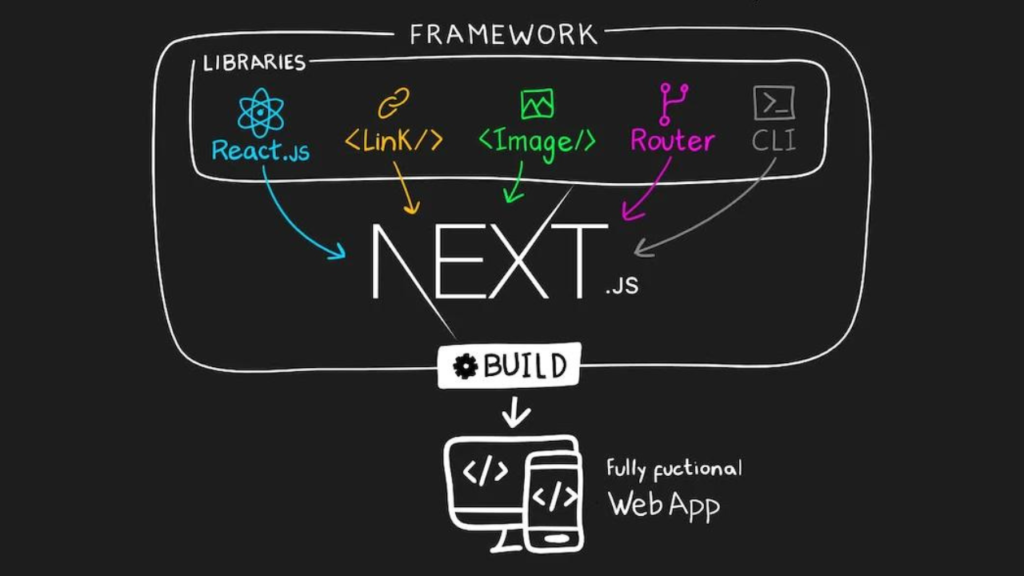Why Choose Next.js Over React?
Next.js is a web development framework that helps create fast, user-friendly websites and applications developed by Vercel company led by Guillermo Rauch. It´s built upon React, a popular JavaScript library, and adds extra features to make web development easier and more efficient.
So, what makes Next.js different so that the world’s top companies choose it? What is the main advantage of Next.js? We will also address key queries such as whether you should choose Next.js over React and who uses Next.js.
Is Next.js better than React.js?
When it comes to choosing between Next.js and React, there are compelling reasons why you might consider Next.js as the preferred option. While React is a popular JavaScript library for building user interfaces, Next.js takes it a step further by providing additional features and benefits.

So, here are some benefits which your company can achieve using Next.js:
Faster loading times
With Next.js, you gain server-side rendering capabilities and automatic code splitting, which improve the initial loading speed of your website or application. When users visit your website or application, the content and features appear quickly without noticeable delays. It is crucial because users might get impatient and leave if your website takes too long to load.
Imagine a potential customer visiting your e-commerce site. With faster loading times enabled by Next.js, the product images, descriptions, and checkout process load almost instantly, ensuring a smooth and seamless shopping experience that keeps customers engaged and more likely to complete a purchase.
Improved SEO visibility
Search Engine Optimization (SEO) is essential for your website to appear prominently in search engine results, driving organic traffic and increasing brand visibility. Next.js helps improve SEO visibility by enabling server-side rendering, code splitting, and automatic static optimization, which means search engines can easily crawl and index your web pages, making them more discoverable.
For instance, if you run a travel agency and use Next.js, your website’s pages about popular travel destinations will have optimized metadata and content that search engines can understand, resulting in higher chances to improve search rankings and increase visibility when potential customers search for those destinations.
Static export capability
With Next.js, you can generate static versions of your web pages, enabling deployment to popular static hosting platforms such as Cloudflare, Vercel, or Netlify. This feature empowers you to showcase your website to the world, ensuring optimal performance and accessibility.
Enhanced development productivity
Next.js streamlines the web development process, allowing your development team to work more efficiently and deliver projects faster. For example, your company wants to launch a new marketing campaign landing page. With Next.js, developers can use reusable components and a straightforward routing system to quickly build and deploy the landing page. It saves development time, ensures consistency across different pages, and enables your marketing team to launch campaigns faster. The enhanced development productivity of Next.js allows your company to iterate and adapt more rapidly, giving you a competitive edge in the market.
Configuration
React’s way of organizing code can be challenging when working with different libraries. It also lacks built-in features, so you may need to start from scratch or rely on third-party tools, making development more complex and time-consuming.
On the other hand, Next.js offers extensive customization options. You can use templates to customize different parts of your project. This level of control over configuration makes Next.js appealing to developers who want precise customization. Next.js offers the advantage of customization, allowing you to adapt and fine-tune various aspects of your project. Whether it’s integrating different libraries or tailoring specific functionalities, Next.js provides the flexibility to meet your precise development needs.
What are the cons of NextJS?
You might ask, but what are the cons of Next.js? Finding an experienced Next.js developer within a tight timeframe can be a real challenge due to the framework’s relative newness. As Next.js is still gaining popularity, the demand for skilled developers exceeds the available talent pool, making it complex and time-consuming to find a qualified developer promptly.
However, you can save your time, money, and a lot of effort as we at KITRUM can help you and provide you with Next.js consulting and highly skilled Next.js developers who will bring your vision to life. With our developers’ expertise and proficiency in Next.js, we ensure that your project is in capable hands.
Contact us today to discuss your project and secure the perfect Next.js developer for your project’s success
Who uses Next.js?
From tech giants to e-commerce platforms and media companies, Next.js has proven its value in delivering exceptional user experiences and driving business success. Let’s explore the scenarios where opting for Next.js will be a strategic decision for you.
E-commerce stores
If you have an e-commerce store, then using Next.js is definitely an advantage. Using Next.js in e-commerce stores offers a range of benefits that improve customers’ shopping experience and streamline business development.
For instance, Nike, a famous sportswear brand, has significantly improved its online presence and user experience by leveraging Next.js. Using Next.js, Nike ensures its website delivers exceptional performance, with fast loading times and smooth navigation. It allows customers to effortlessly browse Nike’s extensive range of products, view detailed product information, and make purchases. Next.js enables Nike to optimize its website for search engines, improving its SEO visibility and attracting a larger audience.
Blog
If you have a blog, Next.js can improve its performance and user experience. With Next.js, your blog can benefit from lightning-fast page loading times, guaranteeing that readers can access your content quickly and effortlessly. Besides, Next.js’s server-side rendering capability enables your blog posts to be optimized for search engines, improving SEO visibility and attracting a wider audience.
Entertainment
HBO Max, TikTok, and Twitch are just a few examples of popular platforms that have embraced the power of Next.js. By leveraging Next.js, these platforms can deliver a seamless and optimized user experience to millions of users worldwide. With Next.js, they can ensure fast page loading times, keeping users engaged and immersed in their content. The server-side rendering capability of Next.js allows them to provide dynamic and interactive features while maintaining excellent SEO visibility.
Finance
Western Union, GiveCrypto, Nubank, and SumUp are financial companies that have harnessed the capabilities of Next.js to elevate their online presence. By adopting Next.js, these companies can offer their customers a seamless and secure financial experience.
Tech
Vercel, Notion, and Sanity.io are among the notable technology companies that have embraced the power of Next.js.
Is Next.js the next big thing?
Next.js is poised to be the next big thing in web development for several compelling reasons. Firstly, it offers automatic code splitting, optimizing page loading times by only loading the necessary JavaScript and CSS files for each page. This significantly improves performance and delivers content to users more quickly. Besides, Next.js provides:
- Pre-rendering capabilities.
- Enabling pages to be rendered before deployment.
- Resulting in faster load times and improved user experience.
The framework also introduces incremental static regeneration (ISR), allowing developers to defer building lower-trafficked pages and dynamically render them upon user request, reducing build times for large sites.
Another noteworthy feature is Hot Module Replacement (HMR), which enables developers to see real-time changes during development without reloading the entire application, leading to increased efficiency. Moreover, Next.js comes with its own routers, eliminating the need for additional configuration and simplifying the navigation process.
All these advantages, along with its extensive documentation and notable websites built with Next.js, make it a highly appealing choice for developers looking to build fast, performant, and SEO-friendly applications.






